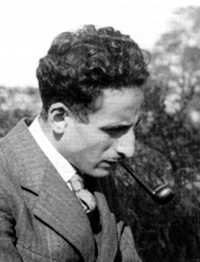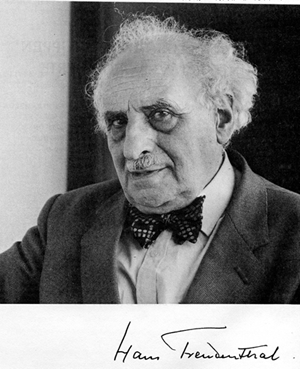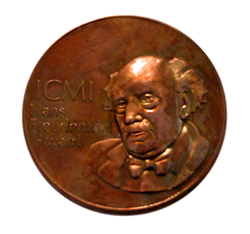 The website is in construction. New files will be uploaded as soon as they are available.
The website is in construction. New files will be uploaded as soon as they are available.
HANS FREUDENTHAL
17 September 1905 Luckenwalde - 13 October 1990 Utrecht

- Brief scientific biography
- Commitment to education
- Essential primary bibliography
- Essential secondary bibliography
- Obituaries
Brief scientific biography
Hans Freudenthal was born in Luckenwalde, a small town in the Prussian province of Brandenburg, between Berlin and Frankfurt/Oder, on 17 September 1905. His parents were Elisabeth Ehmann and Joseph Freudenthal. His father was the precentor and religious teacher of the small local Jewish community. In fact, the house where he was born served as the synagogue. He attended the local state school, Friedrichsschule, which evolved into a Reformrealgymnasium and passed his Abitur there. Although highly interested in the humanities as well as in literature, he decided to study mathematics and physics and entered Berlin university in 1923.
The mathematics professors there were Erhard Schmidt, Richard von Mises, Issai Schur, and Ludwig Bieberbach, and among the younger staff were John von Neumann, Heinz Hopf, and Karl Löwner, who introduced Freudenthal into intuitionism. A visit by Luitzen E.J. Brouwer in the winter semester 1926-27 brought him into closer contact with intuitionism. The following term, summer 1927, Freudenthal spent in Paris, assisting the lectures by Hadamard, Gaston Julia, and émile Picard. After his return to Berlin, he obtained a position as Hilfsassistent at the Mathematical Seminar, allowing him to concentrate on elaborating a doctoral thesis. The subject of the thesis was topology, at that time rapidly developing as a new sub-discipline. The adviser was Hopf, while Bieberbach acted as the formal director of the thesis. He passed the exam in 1930; the thesis itself, on ends of topological spaces and topological groups, made research on these ends popular.
Right after passing the doctoral exam, Freudenthal accepted an offer by Brouwer to come to Amsterdam University, as his assistant in mathematics. This was due more to interest in topology than in intuitionism, although Brouwer's interest in topology was no longer as intense as earlier on. He met there as a fellow assistant Witold Hurewicz; both lectured - after having obtained the status of Privaat-docenten, in 1931 - on algebraic fields, group theory, measure theory, complex analysis, topology, linear operators. In 1936, Hurewicz left for the USA and in 1937 two of the older professors retired, so that Heyting and Freudenthal took over their teaching duties and were somewhat promoted in status, yet not to professorships.
In 1932, Freudenthal married Suzanne (Suus) Johanna Lutter, who had studied German language and literature at the University of Amsterdam. During the Nazi occupation of the Netherlands, she succeeded in having him surviving. After WW II, she became interested in reforms of school pedagogy and introduced the ideas of the German pedagogue Peter Petersen and of the "Jenaplan" schools to Dutch schools.
In the 1930s, Freudenthal became involved for the first time in editing a journal. Brouwer, dismissed by Hilbert in 1929 from the Editorial Board of Mathematische Annalen, due to several deep conflicts, decided to establish his own international journal, the Compositio Mathematica. When the new journal finally began publication, in 1934, it was Hans Freudenthal, who first under the guidance of Brouwer and gradually on his own, conducted the managing of the journal: "Eventually Freudenthal just submitted each complete issue to Brouwer for his fiat. [...] Although Brouwer was the responsible editor, most of the work was done swiftly and competently by Freudenthal" (van Dalen/Remmert 2006, 1088, 1090). He became never a member of the Board, however, probably due to his lacking the title of professor. In 1940, after the occupation of the Netherlands by the Nazi army, the journal had to cease publication. After the war, when Compositio was reorganized - now without Brouwer - Freudenthal became a member of its Editorial Board (see van Dalen/Remmert 2006).
World War II meant a decisive rupture and turn-about. Following the invasion by German troops in May 1940, Freudenthal, like many others, was suspended from his duties at the university in December. Thanks to a lack of bureaucratic attention on the part of the German occupiers, the Dutch functionaries continued to pay the reduced salary during the entire period of War. While at first the suspension meant having plenty of time for personal work, the ongoing oppression made the situation ever more threatening. For a certain time, although regarded as non-Aryan, as Jewish, he was protected by being married with "Suus", his Dutch wife. In 1942, he suffered six weeks in a Gestapo prison when the German occupiers detected that he had a German passport, even without a "J" stamped into it. His fragile health prevented him from being recruited for working camps a few times, but in May 1944 he was interned in a such a camp in Havelte, in the east of the Netherlands, for hard labour. In September 1944, his wife succeeded in helping him escape from that camp, and he returned to Amsterdam where he was eventually able to experience the liberation.
After the end of the WW II, in May 1945, Freudenthal resumed his activities at the University of Amsterdam. In 1946, the faculty of sciences at Utrecht State University offered him the full professorship for geometry, which he accepted, moving to Utrecht. He held this chair until his retirement in 1976. The teaching assignment to geometry made him change his research directions, and his interest now turned to the connection between geometries and their symmetry groups. It was here that his research into Lie Groups began. Eventually, in 1972, he became the founder of yet another journal (see below): the journal Geometriae Dedicata; until 1981, Freudenthal served as its Chief Editor.
The number of his publications is enormous; below we will indicate just a small selection. Major achievements in mathematics were: the theory of ends in topology, the suspension theorems, a spectral theorem for Riesz spaces, the algebraic characterization of the topology of the real semi-simple Lie groups, work on the characters of the semi-simple Lie groups, octonion planes and other geometries connected with the exceptional Lie groups.
He contributed not only to mathematics, but also to philosophy and to the history of mathematics. Yet, his primary interest was not mathematical, but literary. He was an avid reader of the classics of literature; he kept diaries and wrote poetry, novellas, librettos and children's stories; most of these productions remained unpublished. He even participated in several literary contests. Josette Adda has called him a "Homo Universalis".
Commitment to education
It is said that Freudenthal developed an interest in the teaching of mathematics as early as the days of his studies in Berlin. It turned out to be his major field of work, however, only from the 1950s. He became the energetic opponent of the structuralist "New Math" and thanks to the foundation of the IOWO in Utrecht, the founder of a new direction in mathematics education, the so-called realistic mathematics teaching, which would eventually gain international dominance, in particular with and after "PISA".

In fact, since the re-establishment of ICMI in 1952, Freudenthal occupied increasingly influential positions, first on the national - Dutch - and then on the international scene. He became a leading member of the national Dutch subcommittee of IMUK. He organized and published several of the national thematic reports.
Freudenthal has often expressed his regret at not having participated at the Congress in Royaumont in 1959, organized by the OECD, which became the founding event for the "New Math" movement. While he hoped that he might have been successful there in preventing its emergence, he later on showed highly polemical qualities in attacking the nefarious effects for mathematics teaching, which he attributed to New Math.
In 1963, he entered the Executive Committee of ICMI, as a member until 1966, but from 1967 to 1970 as its president (and thereafter, from 1971 to 1978, as ex-officio member). It was in particular during the period of his presidency where he succeeded in launching far-reaching and decisive innovations for the emerging international community of mathematics educators. Unsatisfied with the journal L'Enseignement Mathématique, since 1908 the official organ of IMUK/ICMI, but since 1920 essentially a journal for pure mathematics, in 1968 Freudenthal initiated a new journal, Educational Studies in Mathematics (ESM), which was genuinely international and genuinely devoted to research into mathematics education. Published by a Dutch publisher - Reidel, becoming later Kluwer (and today Springer, New York) --, the journal established itself successfully and is still today one of the leading international journals in the field.
The other decisive innovation was brought about by the small venue afforded by what was traditionally the only section on mathematics teaching within the International Congresses of Mathematicians: it had become inadequate for the communication of problems and ideas in the now rapidly expanding field. This led Freudenthal to organize the first International Congress on Mathematical Education (ICME) in Lyon in 1969. These ICME's have since then evolved into quadrennial congresses and to be the discipline's major events. The first Proceedings were published as special issues of ESM.
Right after the end of his presidency, Freudenthal was able to realize another important innovation, first of all relevant in the Dutch context, but soon to become of international relevance. In 1971 had been established at Utrecht University the Institut Ontwikkeling Wiskunde Onderwijs (IOWO), the Institute for the Development of Mathematics Teaching, with Freudenthal as its director. The founding of such an institute for research and development had been prepared since 1961 by the CMLW - Commissie Modernisering Leerplan Wiskunde. Despite many bureaucratic obstacles, the institute was able to continue functioning; Freudenthal remained its director until 1980. While it was at first dissolved, it was later transformed into the group OW&OC and this became eventually, in 1991, the Freudenthal Institute.

Freudenthal even helped inaugurate another new development within mathematics education, the more specialised psychological studies on learning mathematics for which the group PME (International Group for the Psychology of Mathematics Education) established at ICME 3 in Karlsruhe, began to organize its yearly congresses. The first such congress was organised by Freudenthal in Utrecht in 1976.
Practically as Freudenthal's legacy, the institute's work became decisive in disseminating the particular approach to mathematics teaching, which Freudenthal had at first developed by working with his grandson Bastiaan, the so-called realistic math education, at an unexpectedly broad international level: Due to widely shared criticism of the conceptual assumptions of the TIMSS evaluation study, a new conception was developed for the successor PISA. And this conception, mathematical literacy, was based on the work of the Freudenthal Institute and on its approach called realistic mathematics teaching.
In 2002, the ICMI Executive Committee created two awards in mathematics education research, one of them being the Hans Freudenthal Award, for a major program of research on mathematics education. The award is conferred every two years.
Essential primary bibliography
H. FREUDENTHAL 1958, Logique mathématique appliquée, Paris, Gauthier-Villars
H. FREUDENTHAL (Ed.) 1958, Report on methods of initiation into geometry, Groningen, Wolters ([Reports] / International Commission on Mathematical Instruction / Subcommittee for the Netherlands, 3)
H. FREUDENTHAL (Ed.) 1961, The concept and the role of the model in mathematics and natural and social sciences: proceedings of the colloquium ... / organized at Utrecht, January 1960, Dordrecht, Reidel (Synthese library, [3])
H. FREUDENTHAL (Ed.) 1962, Algebraical and Topological Foundations of Geometry: Proceedings of a Colloquium held in Utrecht, August 1959, Oxford, Pergamon Pr.
H. FREUDENTHAL (Ed.) 1962, Report on the relations between arithmetic and algebra in mathematical education up to the age of 15 [fifteen] years, Groningen, Wolters ([Reports] / International Commission on Mathematical Instruction / Subcommittee for the Netherlands, 5)
H. FREUDENTHAL 1966, The language of logic, Amsterdam, Elsevier. Dutch original, Exacte logica
H. FREUDENTHAL 1965, Probability and statistics, Amsterdam, Elsevier. Dutch original, Waarschijnlijkheid en statistiek
H. FREUNDENTHAL 1968, Mathematik in Wissenschaft und Alltag, München, Kindler
H. FREUDENTHAL, H. DE VRIES 1969, Linear Lie groups, New York, Academic Press
H. FREUDENTHAL 1973, Mathematics as an educational task, Dordrecht, Reidel
H. FREUDENTHAL (Ed.) 1975, Les applications nouvelles des mathématiques et l'enseignement secondaire, Conférences du 3me séminaire organisé par la C.I.E.M. à Echternach, juin 1973, Esch-sur-Alzette (Gr. D. de Luxembourg), Victor
H. FREUDENTHAL 1978, Weeding and sowing: preface to a science of mathematical education, Dordrecht, Reidel
H. FREUDENTHAL 1983, Didactical phenomenology of mathematical structures, Dordrecht, Reidel
H. FREUDENTHAL 1987, Berlin 1923 - 1930: Studienerinnerungen, Berlin, de Gruyter
H. FREUDENTHAL 1987, Schrijf dat op, Hans. Knipsels uit een leven, Amsterdam, Meulenhoff
H. FREUDENTHAL 1991, Revisiting mathematics education: China lectures, Dordrecht, Kluwer Academic Publ.
Essential secondary bibliography
DIRK VAN DALEN 1991, Freudenthal and the foundations of mathematics, Nieuw Arch. Wiskunde, 4, 9(2), 137-143
DIRK VAN DALEN, V. REMMERT 2006, The birth and youth of Compositio Mathematica: 'Ce périodique foncièrement international', Compositio Mathematica, 142, 1083-1102
HANS TER HEEGE (Ed.) 2005, Freudenthal 100: speciale editie ter gelegenheid van de honderdste geboortedag van Professor Hans Freudenthal, Utrecht, Freudenthal Institut, Universiteit. Nieuwe wiskrant, 25,1, Panama-Post, 24, 3
LEEN L. STREEFLAND (Ed.) 1993, The legacy of Hans Freudenthal, Dordrecht, Kluwer
HENK J.M. BOS 1993, 'The bond with reality is cut' - Freudenthal on the foundations of geometry around 1900, in The legacy of Hans Freudenthal, Dordrecht, Kluwer, 51-58
FERDINAND D. VELDKAMP 1985, In honor of Hans Freudenthal on his eightieth birthday, Geometriae Dedicata, 19(1), 2-5
FERDINAND D. VELDKAMP 1991, Freudenthal and the octonions, Nieuw Arch. Wiskunde, 4, 9(2), 145-162
Obituaries
JOSETTE ADDA 1993, Une lumière s'est éteinte: H. Freudenthal, homo universalis, in The legacy of Hans Freudenthal, Dordrecht, Kluwer, 9-19
HENK J.M. BOS 1992, In memoriam: Hans Freudenthal (1905-1990), Historia Mathematica, 19(1), 106-108
JAN P. HOGENDIJK 1991, In memoriam: Hans Freudenthal (1905-1990), Archives Internationales d'Histoire des Sciences, 41(127), 353-354
ANTONIE F. MONNA 1992, Werner Fenchel and Hans Freudenthal, Nieuw Arch. Wiskunde, 4, 10(1-2), 111-114
ANTONIE F. MONNA 1993, Supplementary note: 'Werner Fenchel and Hans Freudenthal', Nieuw Arch. Wiskunde, 4, 11(2), 171
KARL STRAMBACH, F.D. VELDKAMP 1991, In memoriam Hans Freudenthal, Geometriae Dedicata, 37(2), 119
WILLEM T. VAN EST 1993, Hans Freudenthal (17 September 1905 - 13 October 1990), in The legacy of Hans Freudenthal, Dordrecht, Kluwer, 59-69
WILLEM T. VAN EST 1999, Hans Freudenthal: 17 September 1905 - 13 October 1990, in History of topology, Amsterdam, 1009-1019
FERDINAND D. VELDKAMP 1991, Hans Freudenthal: 1905-1990", Notices of the American Mathematical Society, 38(2), 113-114
Author
Gert Schubring
Institut für Didaktik der Mathematik
Fakultät für Mathematik, Universität Bielefeld
gert.schubring@uni-bielefeld.de
